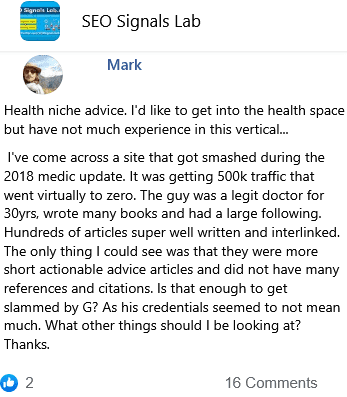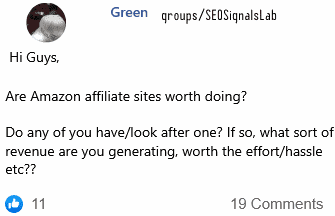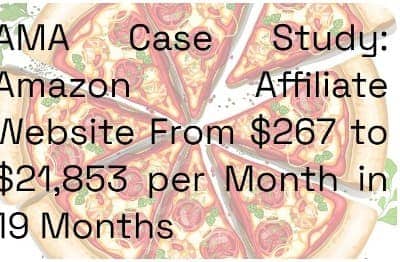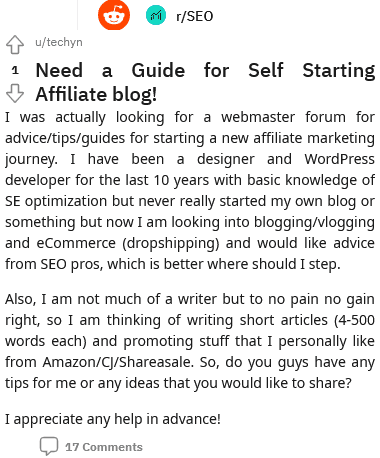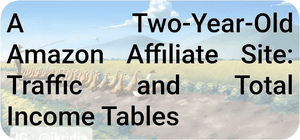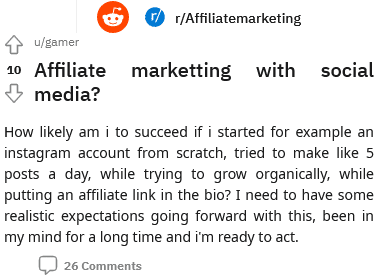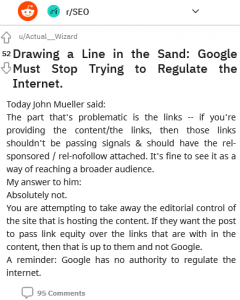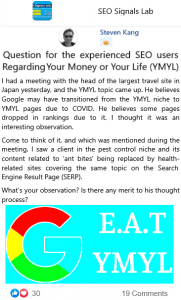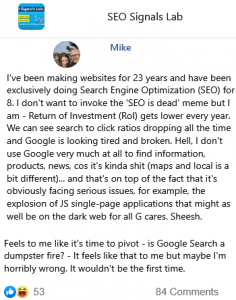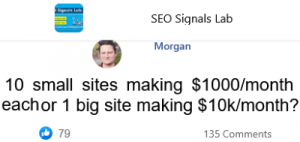Health niche advice. I'd like to get into the health space but have not much experience in this vertical…
I've come across a site that got smashed during the 2018 medic update. It was getting 500k traffic that went virtually to zero. The guy was a legit doctor for 30yrs, wrote many books and had a large following. Hundreds of articles super well written and interlinked. The only thing I could see was that they were more short actionable advice articles and did not have many references and citations. Is that enough to get slammed by G? As his credentials seemed to not mean much. What other things should I be looking at? Thanks.
2 👍🏽2
16 💬🗨
📰👈
Whenever you write something, back it up with some proof.
Most of the Your Money or Your Life (YMYL) websites drop in rankings because they write stuff without having proper references to a study that proves the claim. Websites like Healthline rank for most of the health-related queries because they always claim things that have links to relevant studies. Also, YMYL website articles are supposed to be written by experts in that field. For eg., As an SEO I can create & rank a health blog and say that alcohol is good for health. It is Google's job to ensure that such claims without any substantial proof should not rank and the Artificial Intelligence (AI) is doing a good job right now. This is also one of the reasons that you will not see alternative medicine websites rank high for generic health terms.
Micha
Just off the top of my head …
* Did he nofollow any internal links?
* Did he use "noindex" on any pages?
* Did he delete any pages without redirecting them?
* Did he redirect a bunch of pages to the home page?
* Was the site running a bunch of ads above the fold (keep in mind "the fold" is somewhat ambiguous these days)?
* Were many of the short articles addressing the same or very similar questions?
* Did 1 or more other sites come in and "out-optimize" him for his exact same page titles and topics?
* Were the topics timely (and the clock simply ran out on the query traffic)?
* Did he disavow a lot of links?
* Did he buy a lot of links?
* Did he add a lot of schema markup (could be it was the wrong markup)?
* Was the site hacked?
I'm sure he has some technical issues but going form 500k to nearly 0…
Micha » Mark
You asked for suggestions for things to look at.
Mark ✍️ » Micha
😀…thanks i did…i guess sometimes things are glaringly obvious.. 😅
Peter
I can't remember if it was after Medic or another update I checked out several sites that lost traffic.
They either had bad technical SEO (including lack of schema, very outdated underlying HTML) and/or problematic interlinking structures.
One used a series of subdomains that I couldn't wrap my head around. I haven't looked since to see if that site was improved.
Another site had one article on a topic they had been ranking for (high traffic) and the only other reference to the keyword linked out to Amazon. So no interlinking content silo strategy or keeping the signals on the site.
While I'm not 100% sure that was the underlying cause, I couldn't rule it out either given the degree of the issues.
My underlying theory is that the algorithm increased the bar for technical SEO scores along with the need for a stronger content silo strategy to build "authority" that these particular sites were not meeting.
And then if your question is more about what works in the space.
My 2-cents coming from a personal finance niche. I have a sub-sub niche site that does decently with traffic because it's focused in an area that's underserved by the large websites that are hard to outrank.
Know your niche and where there are gaps in published content. Trying to outrank the big sites that are covering a specific long-tail keyword are harder to outrank. But if you know the topic well, there's opportunity out there. And then down the road, you can potentially up your competition game.
I also say go with the low-competition stuff to start because of all of the chatter with slow indexing on google.
My favorite place to look is people also ask questions at the top keywords. Sometimes you can publish a focused article targeting that "keyword" and rank for it because the existing response is actually wrong. It's also how I have a couple of posts getting a large number of search impressions. It's unlikely I'd rank for that short tail keyword, but being in the People Also Ask on that search result is pretty darn close to next best 🙂
Thanks for your message…so you think that technical stuff…even if it's minor could destroy a site in the health space?…makes me not want to venture into it… 😅
Ghodke
A technical issue with any website will have a negative impact on the website. Need not only to be health website. Expertise, Authoritativeness, Trustworthiness (EAT) is important for Your Money or Your Life (YMYL) websites. You can read more about EAT here.
https://www.searchenginejournal.com/google-eat/what-is-it/What Exactly Is E-A-T & Why Does It Matter to Google?
SEARCHENGINEJOURNAL.COMWhat Exactly Is E-A-T & Why Does It Matter to Google?
Peter » Mark
For the sites I looked at back then, i would suggest the technical issues with these sites were not minor. Sure the sites loaded but the technical SEO was bad. At least one loaded poorly on mobile (an issue when 80-90% of traffic is typically mobile).
There was a lot of chatter at the time that some on the sites were different perspectives on health topics. Before even getting to have that as a conversation the tech SEO quality and some some degree the content strategy needed to be worked out to get to apple to apples.
Expertise, Authoritativeness, Trustworthiness (EAT) and Your Money or Your Life (YMYL) is a whole additional angle but "personal experience" is also referenced in the documentation.
For these types of topics you a) should understand the subject reasonably well and b) have some degree of patience + focus to put in the work
📰👈
Truslow 🎓
The thing with medical stuff is that Google understands a lot of it – so unless you're saying something that is backed by a major consensus in the scientific community already, you need to adjust your strategy a bit.
For example, "Aspirin gets rid of headaches."
Google isn't going to like that. It's not really true. It'll get rid of some headaches – but it's not likely going to tackle a migraine head on.
"Aspirin is commonly used for relief of mild to moderate headaches and other pain."
That's a bit better because it doesn't promise that it "gets rid" of the headache – it's simply used for the relief of it. We're also qualifying the pain here, too.
And, Google can use it's knowledge about aspirin and the way it handles word vectors (words commonly used together – like "used for" and "relief of" compared to "gets rid of") and various other factors to spot that.
Now… in a lot of medical things, the knowledge is new or you're bucking the system – like maybe trying to make a claim that Cannabis can be good for cancer or something like that – something that goes against the knowledge of consensus that Google already has).
If you're trying to dispute things it knows or to create a new area of the knowledge graph – you need to make citations. You need to link out to valid studies and other useful information from someone respected. The better the source, the more faith Google will have in it. Linking out to some far left or right conspiracy site won't help you. A peer reviewed study that contradicts the norm can help, though. Or, for new info – a peer reviewed study that will likely dictate the norm will help.
You also don't ever want to state things as fact. This is often true regardless of consensus. For example, I wouldn't be saying something like "COVID Vaccines greatly reduce the risk of catching or passing along COVID" – even though that's the scientific consensus at the moment.
You want to frame it another way – "The following studies have shown that COVID Vaccines greatly reduce the risk of catching or passing along COVID"… And then source and link to some peer reviewed studies that validate that claim.
By doing this you're taking the burden of proof off yourself (who probably has little authority on the subject at the moment) and putting it on the scientists. You're not saying that your saying that they will do it… you're simply stating the fact that the following studies have shown that it will.
I always look at any YMYL type site along with science (of any kind), law, and finance as something you have to approach content creation as if it were a college term paper. You haven't yet demonstrated or proven your expertise in the field you're writing about so your professor expects you to list and cite your sources. Sure… at that point, you're free to draw your own conclusions and you can (within reason) interpret those findings to suit your needs (to convert visitors) but you can't just go around saying, "Buy this drug because it'll save your life, dammit!" That just won't fly.
Hope that helped.
📰👈
How to Create a Website with Your Money or Your Life (YMYL) Niche?
Any SEO for a client Selling Cannabidiol CBD Oil?
Any Medical claims to Consume Kratom?
